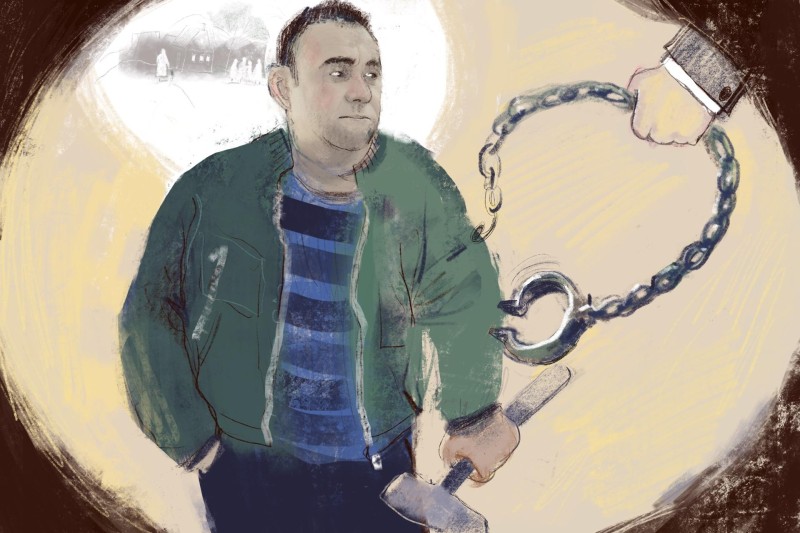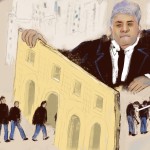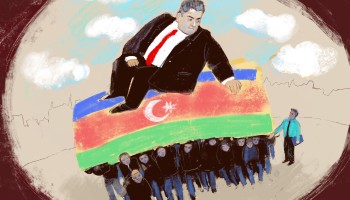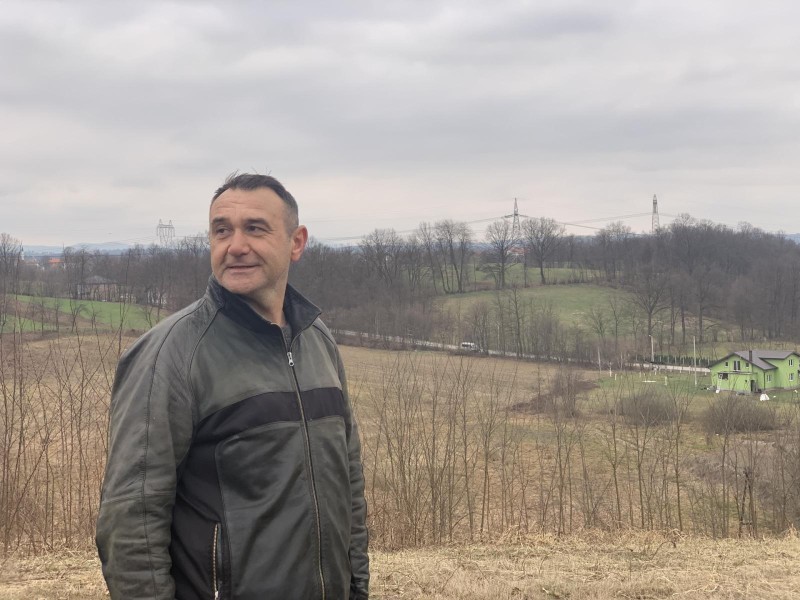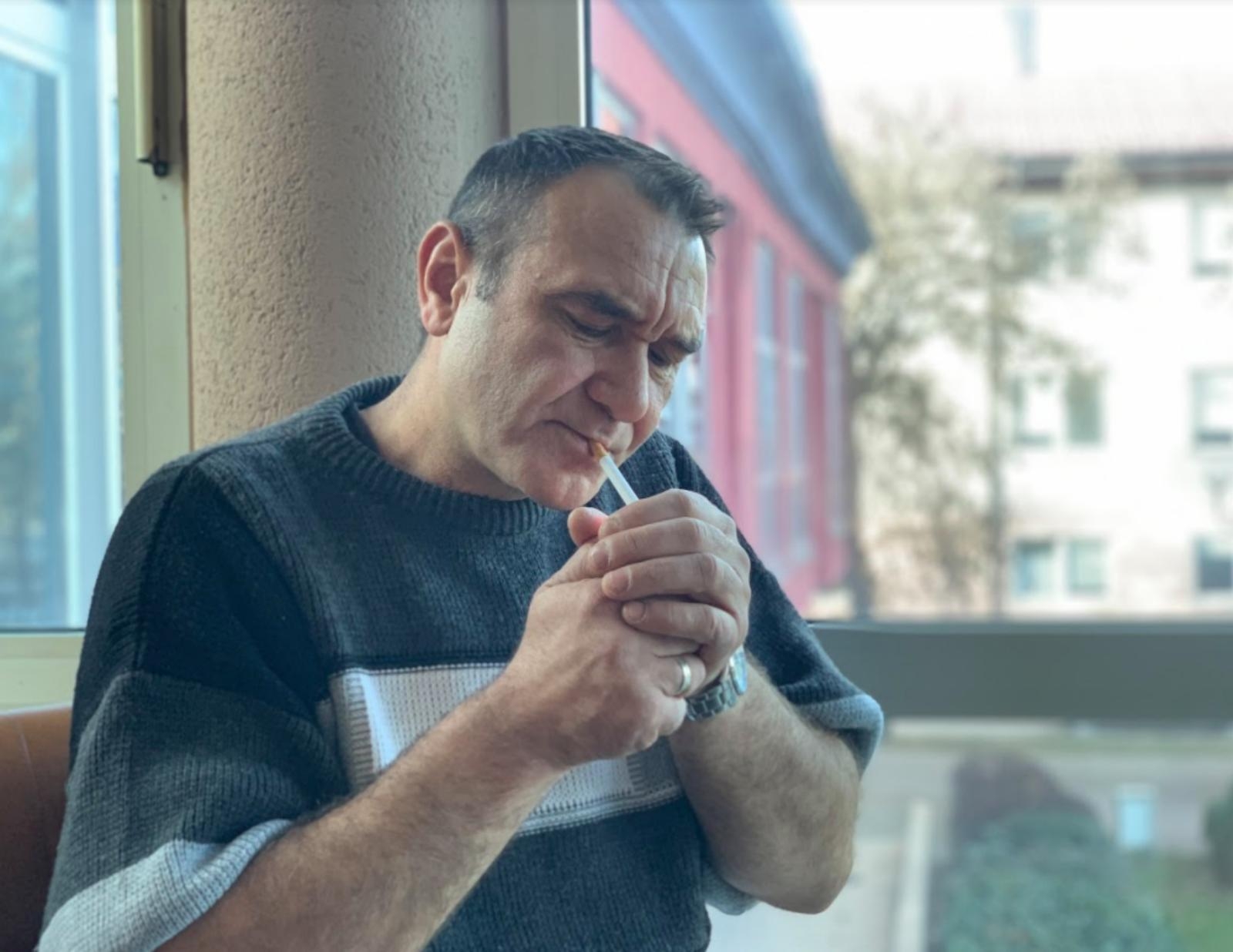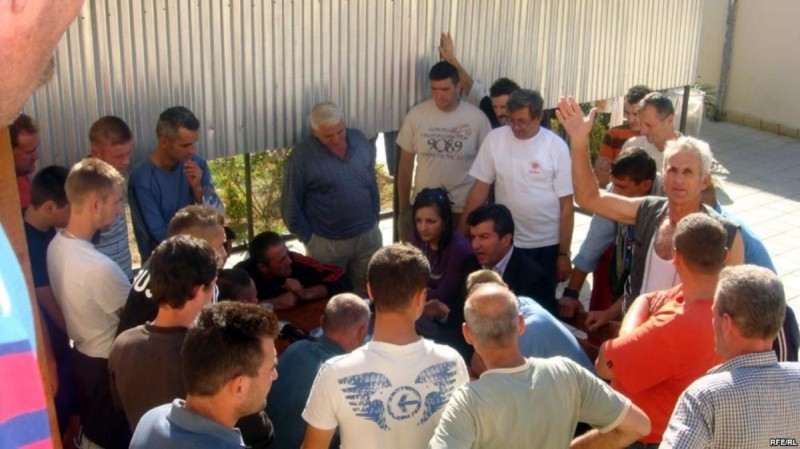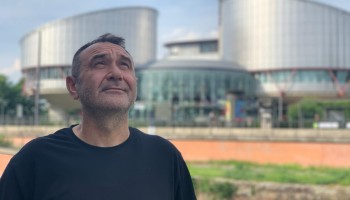“We were in a really tough situation,” Seudin Zoletić said. “Without money. Without food. Without anything.”
Years have passed, but the 46-year-old is still haunted by his nightmarish ordeal as a forced laborer in Azerbaijan. “It marked my life forever,” he said.
Zoletić now lives in his hometown of Živinice, a working-class city in northeastern Bosnia and Herzegovina. The tall, gentle man met an OCCRP reporter three times over the course of several months to tell his story.
As he smoked cigarette after cigarette in a smoky local cafe, pop music blaring in the background, Zoletić recalled his months trapped at a work site in a far-away country. He described his failed fight for justice against that country’s regime. And he expressed his hope that, this year, in the hands of a European court, he would find it at last.
Zoletić kept returning to the subject of his family: two promising sons he calls his “golden boys” and an ailing wife to whom he is devoted. It was to support them that he accepted what sounded like an attractive offer in the summer of 2009 to work on a construction site in Azerbaijan’s capital, Baku. The people who hired him promised good pay, excellent conditions, and decent accommodation.
Zoletić was one of over 700 working-class men from Bosnia-Herzegovina, Serbia, and North Macedonia who accepted similar offers in search of a better life. Between 2006 and 2009, they built some of the most prominent buildings in Baku, including a grand event space called the Buta Palace and a massive exposition center. At least three of the multi-million-dollar projects were financed by the government.
But most of the workers were treated as little more than modern slaves. Along with hundreds of others, Zoletić lived in cramped conditions, with little food, working grueling, 12-hour days. His passport was confiscated. Some workers were beaten. One died in Zoletić’s arms. And their promised wages were severely reduced or not paid at all.
Zoletić had no idea who was behind SerbAz, the company that hired him. Now, an investigation by OCCRP reveals that there are strong reasons to suspect the firm was jointly owned by the wife and close associate of Azad Rahimov, Azerbaijan’s Minister of Youth and Sports. Rahimov’s ministry appointed SerbAz to fulfill some of the construction projects, worth 54 million manat (US$65.8 million).
If true, the new evidence uncovered by OCCRP implicates the well-connected insider in one of the largest cases of labor exploitation ever to take place in modern Europe. It also raises questions about Azerbaijan's first family, which has maintained a tight grip on power since 2003. Rahimov is known to be a close associate of the country's president, Ilham Aliyev, and one of the private facilities where the workers labored, an upscale shopping mall, now belongs to the Aliyev family.
Azad Rahimov, his wife Zulfiya, and her business partner did not respond to requests for comment for this story. The company that now owns the mall denied engaging SerbAz for the work and provided no further information, citing confidential commercial contracts.
Zoletić’s efforts to find justice in Azerbaijan have failed. A legal challenge to his treatment was repeatedly rejected by the country’s pliant courts, and a prominent activist who took it up was driven out of the country. His last hope is the European Court of Human Rights, which is expected to rule on the workers’ case this year.
While many of the other workers are reluctant to talk about their days in Azerbaijan, Zoletić said it was important for him to do so: “If more people know about it, it will be harder for it to happen again.”
“I never imagined that life could be so cruel, to inflict such injustice, such evil on people,” he said. “In the 21st century.”
“I Believed in SerbAz”
Zoletić remembers his childhood in socialist Yugoslavia as happy and carefree. His father, a coal miner, earned a decent salary and the family lived well. Zoletić remembered playing ‘Cowboys and Indians’ on a hill near his home, which was far enough from Živinice’s center that neighbors kept farm animals on their properties. Even now, he is full of affection for his little corner of Bosnia.
“Life, it’s beautiful,” he said. “I love my country. Živinice, too. [Even] in these hard times, I find it beautiful.”
But as he grew older, Zoletić endured many disappointments.
The tall young man envisioned a professional basketball career, but suffered an injury as a teenager and had to quit. His dreams of being a soldier were initially dashed when the Yugoslav National Army did not admit him — because of his Muslim background, he believes. A few years later, when Yugoslavia disintegrated, he joined the army of the newly independent Bosnia and saw action on the front lines.
After being demobilized in 1997, Zoletić was hired by a large shoe factory in the city of Tuzla, eventually growing to enjoy the repetitive work and earning a promotion to a supervisory position.
But by 2009, his factory, like many others in Bosnia, was in trouble. The workers, who were poorly paid, poured into the streets to demand government help. Zoletić needed to find a better way to support his family.
That was when he first heard about SerbAz, a company that was hiring local men for high-paying construction jobs in Azerbaijan.
“I was interested,” he said. “Why wouldn’t I be? … Especially after I saw who went, and returned, with cash.”
Along with several other applicants, Zoletić travelled to another city to meet with a SerbAz recruiter. He was offered a construction job, signing a brief “statement” that listed the terms of his employment and warned about standards of conduct. He now realizes that this was not a legal contract — and that it should have been a warning of what was to come.
But at the time, the promised wages of five to eight dollars per hour were too appealing. “I was optimistic, certainly,” Zoletić said. “I believed in SerbAz.”
He waited for weeks to hear that it was his turn to go, calling company representatives over and over. Finally, two months after signing on, he was told to pack his things.
Along with 20 other men from Živinice, Zoletić took a minibus to the Serbian capital, Belgrade, where they were joined by another group of Bosnian men. Many were younger and less experienced than him. Some were still teenagers.
But they shared Zoletić’s optimism. In Bosnia, even those lucky enough to have work were unlikely to earn much more than $200 per month. If SerbAz’s promises were true, they would earn that amount every few days in distant Baku.
“We were heading into a brighter future,” Zoletić said. “That’s what we believed.”
Reality Strikes
Almost as soon as he landed in Azerbaijan, Zoletić saw that his fate was no longer in his own hands.
After being led through immigration control and issued one-month tourist visas, Zoletić said his group was met by two men he described as “bosses.” The new arrivals stood like “soldiers in the army,” he remembers. They were told to hand over their passports for safekeeping.
Zoletić doubted that anyone would take better care of his passport than himself. But, realizing he had no other choice, he did as he was told.
Saša Lipovac
Saša Lipovac, one of the two men who met the group in the airport, was one of the most fearsome characters the workers encountered in Azerbaijan.
The group was then herded onto a convoy of minibuses. Zoletić sat and waited, worried about his missing passport and anxious to see where he would be taken. He was close to three others on the bus who had also come from Živinice. As some of the men were dropped off at different locations, he prayed that he and his friends would end up together.
At last, the minibus pulled up in front of a large house, surrounded by 4-meter-tall walls and a big gate. Zoletić remembers his shock at seeing that around 100 men were already living inside. “We were looking at each other: ‘What is this? Oh my God, where am I?’”
“There was no more room [for us],” he said. “Not for six, or even for two.” His overseers improvised, placing beds for him and his friends in a hallway.
The group was told they would only be allowed to leave the crowded house with an exit pass and approval from their minders. “Could we run away, climbing over the fence?” Zoletić remembered wondering. “But where would we go without our passports?”
He was not alone in his shock. All of the foreign workers except the most skilled were placed in similar group homes, five altogether. Each bedroom was fitted with bunk beds so tightly arranged that it was difficult to squeeze between them. It was typical for up to 24 men to share a single room. The house’s corridors, a sauna, and even a swimming pool had been converted into sleeping quarters to accommodate still more workers.
On his first day, Zoletić recalled being consoled by more experienced hands, who encouraged him to think positively. But the mood changed again that evening, when the bosses visited the house. They informed the workers that their salaries would be “kept” for them as a precaution against loose spending in a foreign city. They should not expect payment until they went home.
This was Zoletić’s first introduction to the “white helmets,” as he and the other workers called their overseers. For the next several months these men — who were from his part of the world, not Azerbaijanis — would determine how he spent his every waking hour.
‘In a Delirium’
The 12-hour days were grueling. Every morning, Zoletić and the others were awakened by a house supervisor shortly after 5:00 a.m. and taken to their respective construction sites. His task was to install drainage panels where the future exposition center would stand.
They were served meals at the site, but the food was meager, sometimes consisting only of discolored salami, plain eggs, and stale bread. “Only the tea was good,” he said. “You could drink it with the bread.”
In interviews with reporters, multiple workers said they were always hungry during their time in Baku and had lost weight from the poor nutrition.
“Many looked like they had just come out of a concentration camp .… [They were] unrecognizable compared to when they just arrived,” Zoletić said.
To supplement the poor food on the site, the workers could buy more from a canteen operated by SerbAz at their compound, subtracting from their future wages. Zoletić said the scheme was designed to prevent them from leaving — a “semi-open prison,” as he described it.
The men didn’t return to the compound until 9:00 p.m. After the 12-hour workday, Zoletić’s ankles swelled and ached from exhaustion. “I used to freeze a half-liter water bottle in the morning before work. And [use it] to massage my feet after.”
In a building that housed dozens, there were only two showers and two toilets. Some workers waited hours to use the bathroom. “By time it’s your turn to take a bath and wash your feet, it’s already 10:30 or 11:00,” Zoletić said. He remembered sleeping just five or six hours a night.
Sometimes, he didn’t get even that. On several occasions, he remembered being awakened by the house supervisor running through the corridors and banging on doors. The men stood in their underwear, shivering in the cold.
“It was an alcohol test, imagine that,” Zoletić said. “They tell you to blow. You’re all lined up, and they’re checking you. It’s unbelievable. In a delirium, you’re trying to understand what’s happening. Are you dreaming, or what? It’s an ugly dream.”
Those who tested positive were docked $500 from their largely imaginary salary. This technique of “fining” the workers to reduce their earnings and instill obedience was a constant threat, Zoletić said.
“The so-called supervisor would check how the beds were made,” he said. “If they weren’t made as he thought they should be, he would fine us.” Even pausing to rest or taking too many toilet breaks on the construction site could result in a fine.
One day, Zoletić remembered, the workers thought their work for the day was over and put down their tools. One of their overseers ran out and yelled at them to return to work for one more minute. The men hung their heads and returned to the job. “By the time we were back, that minute had passed, anyway. They were just flexing their muscles.”
“That hurt me a lot,” Zoletić said, remembering his humiliation. “it was below any human level.”
On another hot summer day, a careless colleague on the work site dropped a metal pipe, hitting Zoletić on the head. He bled profusely. The bosses brought a doctor who stitched up his wound, but he never got a proper diagnosis or a detailed exam. “They treated me like a little dog,” he said.
His colleagues collected money to help him buy medicine. But he worried that without proper medical attention, he might get an infection, or worse.
“I thought of my family,” he said. “If only I could fly into the sky and just get out of there. It was a battle for survival.”
Just three days later, with the wound still fresh and stitches on his head, he was sent back to work.
Death in the Compound
The harsh conditions soon started to take a toll.
In August, one of the workers from Živinice, a man Zoletić knew, died of a heart attack in his dormitory in another Azerbaijani town where SerbAz also had a construction project.
Then came a period in early October when there was not enough work to go around. Zoletić and the others lingered in their compound with nothing to do — and nothing to eat. “It felt like a crisis,” he said. “It was easy to see in the canteen, where there were fewer items. And they were not bringing any more.”
One afternoon, one of the workers fell gravely ill. The others brought him into the yard and tried to resuscitate him, but it was no use. The man died in Zoletić’s arms.
He remembered having seen this man, a mechanical engineer, drinking coffee and smoking by himself in the garden. “He was there for a very short time,” Zoletić said. “He was down mentally, we were all taking it badly. Some less, some more. The man, unfortunately, couldn’t bear it.”
“It shook us all. In a situation that was crazy anyway, we were looking at a dead man. … We were out of our minds. What should we do? What now? And then the police came.”
The officers who came to investigate the death interrogated the workers but appeared to take no interest in their condition, their reasons for being in the country, or their lack of proper immigration documents. They remained trapped.
Just a few days later later, the gas supply, electricity, and water service was cut off. “And then we had nothing,” Zoletić said.
In his despair, he noticed one positive thing: Though the workers were of different nationalities and had come from a region that had suffered a deadly war not long before, the past seemed not to matter. “We were like one,” he said. “Like brothers.”
The men started to open up to one another and Zoletić heard from others about horrors he had not even known to fear. “They would beat people up in rooms where they turned on loud music,” he said. “So that others wouldn’t hear their moans.”
The Truth Comes Out
The workers’ desperation and growing hunger finally drew wider attention.
The first to take note of their plight was a man who sold them food and cigarettes from a small kiosk near one of the SerbAz construction sites. They had started to run out of money, he noticed, and were clearly hungry. For days, he had been allowing them to buy food and cigarettes on credit.
The vendor contacted a local non-profit organization that helped foreign workers, the Azerbaijan Migration Center, run by a former police officer named Alovsat Aliyev. One of Aliyev’s employees dropped a multi-language informational booklet about the organization over the fence. Soon enough, one of the workers got in touch.
Aliyev arranged to meet him near the compound one evening. The worker had to leave in secret to avoid the guards, but his descriptions and photos of how he and his fellows were living were enough to spur the activist into action.
Aliyev’s first step was to get in touch with the press. In a country known for its crackdowns on free media, he went to the Azeri service of Radio Free Europe/Radio Liberty, an outlet funded by the U.S. government and one of the few that could do independent journalism in the country. (It has since been shut down.)
Together with RFE/RL reporters, he rushed to the house. A video filmed by the journalists shows the moment Aliyev first encountered the imprisoned men. They are lean and hungry, crowding around their rescuers in desperation. Zoletić is there too, standing in the back.
“I looked at their food,” Aliyev said. “There was a 50-liter bucket with soup and something was swimming in it. I opened the fridge and there was nothing. No drinking water. There wasn’t even water for them to take a shower.”
“It was terrifying,” he said. He immediately sounded the alarm, organizing a press conference and getting in touch with the men’s embassies and international organizations.
The authorities refused to intervene, so the Organization for Security and Co-operation in Europe (OSCE) and several other institutions paid for Aliyev’s organization to provide food and hygiene products for the stranded men.
“That’s when our liberation began,” Zoletić said. “We gave our statements. They came to see our living conditions, what we were doing, and they were appalled.”
“We got lunch boxes to survive, like during the war in Bosnia.”
By then the workers’ story was in the news, and their bosses and overseers disappeared in the face of public scrutiny. The gates to the workers’ compound were now unlocked, but they still had no idea what was going on and had not been given their wages or passports
Behind the scenes, Aliyev was holding meetings with representatives of the Azerbaijani government. He was trying to get the workers classified as trafficked laborers, paid for their work, and sent home. But the process was slow and he faced stiff resistance.
The workers grew more desperate. “One man threatened to jump from a roof if they didn’t let him go,” Zoletić remembers. After he was sent home, the others tried different tactics to force the company to send them back to their home countries, like sleeping on the streets and holding public protests.
Finally SerbAz started sending the workers home, a handful at a time. Every morning, the company’s Azerbaijani employees released a list of the lucky few who would leave that day. Because his name was last in the alphabet, Zoletić had to wait the longest.
To pass the time, he roamed the streets of Baku. Sometimes he boarded random buses and rode to the last stop. The little Russian he understood helped him befriend some young people. He played several football games with them, managing, at least briefly, to forget his predicament.
After 20 days of waiting, Zoletić finally saw his name on the board. “It was an indescribable joy,” he said. “I was going home. I couldn’t sleep that night.”
To receive their meager compensation, the workers were forced to sign a statement saying they were not owed any money for their work in Azerbaijan.
“We got a paper to sign saying that everything was normal, that everything was wonderful, that they didn’t owe me anything. And after I signed they paid me as much as they wanted, nobody knew how they calculated it,” Zoletić said. The ultimate amount was up to SerbAz, and no worker interviewed by OCCRP said he received what he thought he had earned.
Zoletić and the others were escorted to the airport by the police and finally given their passports. Not even their shabby earnings could dampen their spirits. On the plane they broke out in song, serenading the crew with "Čarsija," a nostalgic Bosnian tune about returning home.
Zoletić recalled his emotion at being reunited with his family after three months living as a virtual slave. “Happiness that I came home. Happiness that I saw my loved ones. Happiness that they saw me.”
A Fight for Justice
Since returning, Zoletić and the others have become key figures in several legal cases launched in response to their treatment.
A Serbian anti-trafficking organization, Astra, spent several weeks collecting the workers’ testimonies and helping them return to their lives. Based on its report, Bosnian prosecutors launched an investigation and indicted 13 local SerbAz representatives — the men who had recruited the workers and ruled their lives in Baku — for human trafficking.
Zoletić appeared in court as a witness. Initially, the seeming imbalance of the case was intimidating. “On one side it was me and the prosecutor, and on the other side there were 13 attorneys,” he said.
But his discomfort disappeared once he started answering questions. “I was telling the truth,” he said. “I was not afraid of anything anymore.”
Unlike in Azerbaijan, he was now at liberty and his former tormentors had been charged with serious crimes. “They are on trial. And I’m in my own country. I’m free.”
The result, after numerous delays, was a partial victory. Four of the indicted men admitted their guilt; one was sentenced to a year and nine months in prison and three were given conditional sentences. The others were found not guilty.
Meanwhile, in Azerbaijan, Aliyev’s organization launched a suit against SerbAz on behalf of the workers for delayed wages and moral damage. But they lost the case, as well as two appeals. The defense SerbAz presented, which appeared to satisfy the judges, was that the workers had actually signed employment contracts not with SerbAz but with its corporate parent, a company registered in Anguilla, a Caribbean island. Therefore, the company’s lawyers argued, Azerbaijani employment law did not apply in the case.
“We didn’t have an opportunity to give our statement, to be present at the trial,” Zoletić said. “I think they didn’t even try, not to mention exhaust all the legal remedies to reach the truth in their court … They simply rejected it.”
The matter has now reached the European Court of Human Rights in Strasbourg, which is due to reach a ruling this year on whether the workers had received a fair hearing in the Azerbaijan courts.
Justice in Strasbourg?
Belma Skalonjić, a representative of the Bosnian government at the European Court, explained what was at stake in the case.
Zoletić is now back in Živinice. The shoe factory where he worked is now bankrupt, and he is working part-time in a greenhouse, where he can indulge his love of plants.
He is proudest of his two sons, who he barely spoke to throughout his ordeal in Baku. One of them, now in his 20s, has just married. The younger, still a teenager, is a good student and has aspirations to study information technology.
Asked what he was fighting for, Zoletić was clear that, for him, it was not about his missing wages.
“There’s no kind of money for which a man would want to go through what I went through,” he said. “Nobody can give you enough money to make you forget everything. There is no such money. … But I would like to persevere, to see that we were on the right side. And for those who did this to be punished, and for justice to win.”
With additional reporting by Azhar Kalamujić, Mubarek Asani, Lejla Čamdžić, Aida Čerkez, and Igor Spajić.
